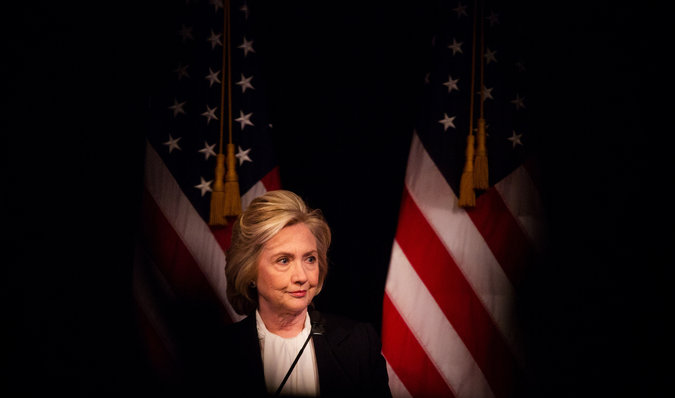Hillary Rodham Clinton’s presidential campaign has been slow to harness the fund-raising power of the Democratic Party’s legions of grass-roots donors, according to reports filed Wednesday, a weakness that her campaign is racing to combat.

Of the $47.5 million that Mrs. Clinton has raised, less than one-fifth has come from donations of $200 or less. That is a far smaller proportion than that of her Democratic and Republican rivals who have excited grass-roots donors on the left and right, such as Senators Bernie Sanders of Vermont and Ted Cruz of Texas. While Mr. Sanders raised far less than Mrs. Clinton over all — about $15 million, including money transferred from his Senate account — about four-fifths of that amount came from smaller donors.
The slow response of grass-roots donors is a consequence, Mrs. Clinton’s aides and advisers said, of the deliberately low-key approach she has taken on the campaign trail — with few of the big rallies and campaign events that can help build voter lists and drive donations — along with the challenge in persuading some donors that Mrs. Clinton, who is far ahead in primary polls, needs their money.
The deficit could represent a financial and strategic liability for Mrs. Clinton if she were to win the nomination. The pool of Republican donors willing to write the maximum $2,700 check has grown so large that no Democrat, not even Mrs. Clinton, is likely to be able to match a mainstream Republican nominee on high-dollar fund-raising over the long term. In 2012, President Obama and his party were able to match the Republican candidate, Mitt Romney, only by raising far more money than Mr. Romney from small donors.
Given the prodigious amount of money on the Republican side, the Democratic nominee absolutely has to overperform among small donors, said David Axelrod, who advised Mr. Obama’s two successful presidential campaigns.
Campaign officials said that operational hurdles and administrative delays also have impeded her outreach to small donors. On the day that Mrs. Clinton sent out emails in April announcing her presidential bid, a campaign official said, many of the messages bounced back. Fewer than 100,000 of the 2.5 million email addresses collected during her 2008 campaign, it turned out, were still active. The campaign did not gain access to a huge list of supporters, built over two years at substantial expense by a pro-Clinton super PAC, Ready for Hillary, until a month and a half after Mrs. Clinton’s announcement.
Some of Mrs. Clinton’s allies acknowledge that Mr. Sanders has done a better job of engaging small donors on the left. The small donors right now are very much attracted to what Bernie is saying, said Ed Rendell, a former Pennsylvania governor and a Clinton supporter.
Mrs. Clinton’s campaign has responded with a new program, the Hillbuilder Initiative, intended to build a more robust online presence and harvest the grass-roots money and enthusiasm that can come with it. But the slow start has bewildered some longtime supporters, who recall small-donor enthusiasm as a crucial piece of Mr. Obama’s win over Mrs. Clinton in 2008.
Relying more heavily on large donors could also present an unwanted contrast not only to other candidates, like Mr. Sanders, but with Mrs. Clinton’s own statements about fighting for those who feel locked out of the economy. Mrs. Clinton has attended 46 fund-raisers since she entered the campaign, many of them for donors giving the largest possible check. Mr. Sanders has attended two.
We’re spending our time talking to people, rather than sitting around in small rooms talking to very wealthy people, Mr. Sanders said in an interview on Wednesday, as he prepared for a campaign rally in Phoenix. These are working people, middle-class people who are making these contributions.
Wednesday’s campaign filings underscored not only how small donors have powered insurgent candidates, but how the growing world of super PACs and outside spending have upended conventional measures of fund-raising strength.
Mrs. Clinton’s campaign has taken in three times more money than any of her Democratic or Republican rivals, according to Federal Election Commission data filed by the 2016 candidates on Wednesday.
But super PACs and other outside groups set up by allies or former aides to the Republican candidates have dwarfed the top Democratic super PAC — as well as most of the Republican campaigns — collectively raising in excess of $200 million and startling some in Mrs. Clinton’s camp.
Jeb Bush’s super PAC, Right to Rise, raised more than $103 million, on top of $11 million raised by his campaign, giving him an effective war chest twice as large as Mrs. Clinton’s. Priorities USA, the lead Democratic super PAC, has raised $15 million, and Mrs. Clinton’s allies are struggling to persuade her wealthiest backers to make seven- and eight-figure donations to the group.
The only silver lining, Democrats said, was the knowledge that much of the Republican super PAC money would be used to savage other Republicans, in what is likely to be a long and hard-fought primary campaign.
What it means is that they are going to tear each other apart in the primary season, said Mr. Rendell, who predicted that Mrs. Clinton’s small-dollar fund-raising would grow substantially in the months ahead.
Some Democrats privately said that Mrs. Clinton’s campaign fund-raising is less impressive than it appears. Aside from Martin O’Malley, the former Maryland governor, who reported raising $2 million for his campaign, Mrs. Clinton has no competition for the Democrats’ big-donor establishment, which handed out a combined $80 million to a crowded Democratic primary field during the equivalent fund-raising period in 2007, the last open primary.
She also has been slow to seize the chance to raise money jointly with the Democratic National Committee. Under legislation passed in December, the party can accept up to $334,000 from each donor every calendar year — 10 times the amount in past years. One leading Democratic donor, who asked not to be identified so as not to damage his relations with Mrs. Clinton, estimated that the Democrats could be leaving $60 million to $70 million on the table.
While some Clinton allies say they are not concerned about the campaign’s potential to excite small donors, the difficulty that Mrs. Clinton has faced presents a paradox of her position as a kind of de facto incumbent in the fight for the Democratic nomination. Without a pitched primary battle — like the one she faced against then-Senator Barack Obama eight years ago — it is far more difficult for Mrs. Clinton to create urgency among her financial and political base this early in the campaign.
But an all-out fund-raising blitz, or a campaign built around larger events, could stoke the aura of inevitability that she is determined to avoid.
A spokesman for Mrs. Clinton, Josh Schwerin, said the campaign was thrilled to have 250,000 donors in our first quarter in the race, and our Hillbuilder program is already paying off with a rapidly growing list that is active and engaged.





